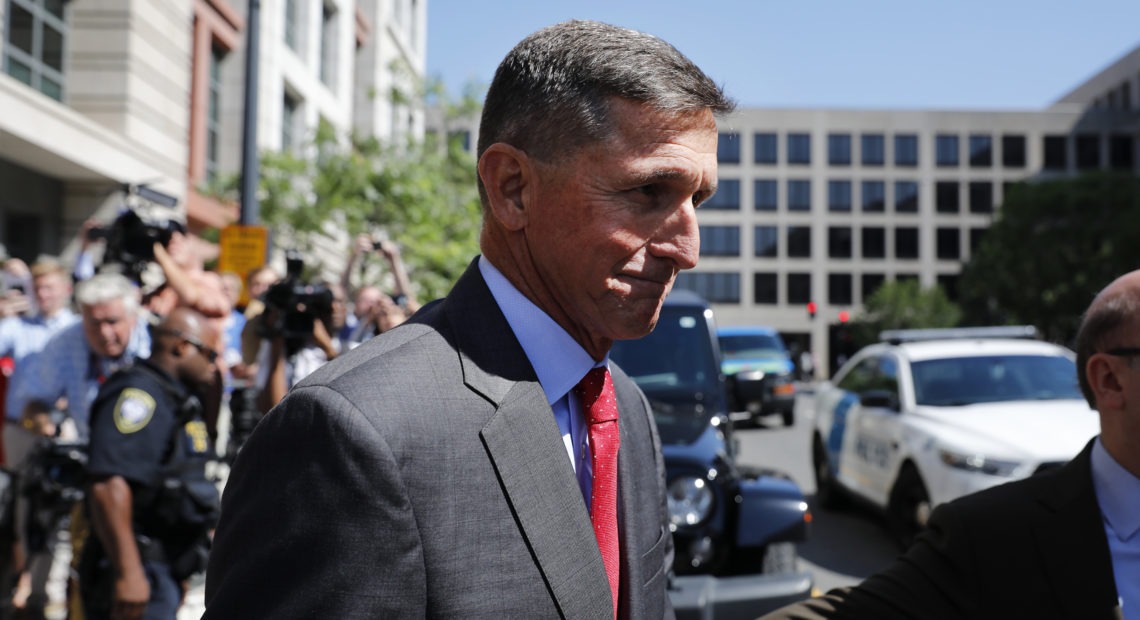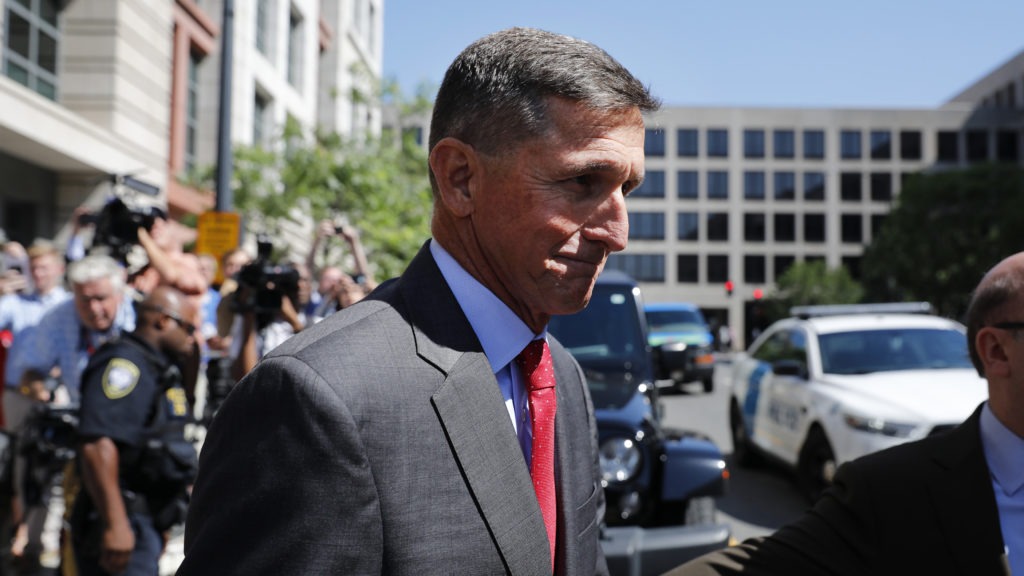
President Trump Pardons Michael Flynn, Who Pleaded Guilty To Lying About Russia Contact
LISTEN
President Donald Trump has pardoned his first national security adviser, Michael Flynn, who spent years enmeshed in an often bizarre legal war with the government that sprang from the Russia investigation.
Trump announced the news Wednesday on Twitter as Americans prepared to observe the Thanksgiving holiday this week.
The pardon brings an end to a long-running legal odyssey for Flynn, who was the only member of the Trump administration to be charged as part of special counsel Robert Mueller’s Russia investigation.
Flynn pleaded guilty in 2017 to lying to the FBI about his contacts with the Russian ambassador and then cooperated extensively with prosecutors. But he ultimately reversed course and accused the government of trying to frame him.

President Trump has pardoned Michael Flynn, his former national security adviser, pictured at the E. Barrett Prettyman U.S. Courthouse in Washington, D.C., in July 2018. CREDIT: Aaron P. Bernstein/Getty Images
Flynn went so far as to withdraw his first plea of guilty and substitute a second plea of not guilty, even though he’d acknowledged the underlying conduct that was against the law and been close to receiving a sentence.
The pardon drew condemnations from critics who’ve said Trump’s actions to help his friends interfere with the justice system. House Intelligence Committee Chairman Adam Schiff, D-Calif., for example, who helped prosecute Trump at his impeachment, called the president’s actions obviously corrupt.
Flynn, about an hour and a half ahead of Trump’s announcement, tweeted a Bible verse alluding to a holy rescue.
Trump’s action on Wednesday may open the door to possible clemency for other former advisers who were indicted as part of the Russia investigation, including Paul Manafort, his former campaign chairman.
Justice Department not consulted
The Justice Department was not consulted about the Flynn pardon in the way it often takes part in the preparation of presidential pardons, a department official said on Wednesday. The official described the situation on the condition that the person not be identified.
The Justice Department did get a “heads-up” on Wednesday, the official said, and the person said that “this is obviously an appropriate use of the president’s pardon power.”
Justice Department leaders would have preferred, however, for Flynn’s case to have been resolved in court, where federal Judge Emmet Sullivan still had not ruled on the government’s request to abandon its prosecution.
Justice Department leaders were “confident in the likelihood of our success in the case,” the official said Wednesday.
Longtime military spy boss
Flynn is a retired Army lieutenant general who once led the Defense Intelligence Agency.
He became a security and geopolitical consultant in private life and took tens of thousands of dollars in payments from Russian entities. In 2015, Russia’s state-backed TV network RT paid him $45,000 to attend a dinner in Moscow, where he sat at the right arm of President Vladimir Putin.
Back in the United States, Flynn became a vocal supporter of Trump’s outsider campaign in the 2016 presidential race. At the Republican National Convention that year, Flynn led the crowd in chants of “lock her up” about Trump’s rival, Hillary Clinton.
When Trump took office in January 2017, Flynn was rewarded for his loyalty with the job of national security adviser, a post that put him in the White House at the president’s side.
But questions already were swirling about Flynn’s Russian contacts, including with Russia’s then-ambassador to the United States, Sergey Kislyak. Flynn was forced to resign after less than a month on the job for allegedly misleading the vice president about his conversations with the Russian envoy.
Flynn was interviewed by the FBI in January 2017, just days after assuming his White House post.
Intelligence and law enforcement officials worried that the Russians’ knowledge about the true facts of Flynn’s discussion with Kislyak could open Flynn up to the prospect of coercion, given the contrast with his public statements at the time.
Flynn lied to the agents about his conversations with Kislyak, saying he didn’t urge Moscow not to respond to sanctions the Obama administration imposed on Russia in retaliation for the Kremlin’s election interference.
Legal odyssey
Flynn pleaded guilty in December 2017 to making false statements to the FBI. He went on to cooperate extensively with Mueller’s team, providing “substantial assistance” to the special counsel’s investigation, according to court papers.
Before the Mueller investigation wrapped up, Flynn appeared in court in December 2018 for his sentencing. The Justice Department had said it would not object to Flynn receiving no prison time.
Flynn’s defense team, however, tried to downplay his crimes despite his admissions and his guilty plea. That prompted sharp criticism from the presiding judge, Sullivan, who said it raised questions about whether Flynn truly accepted responsibility for his actions.
Sullivan postponed sentencing to allow Flynn to complete his cooperation, including testifying against his former business partner who was facing charges tied to foreign lobbying.
In the summer of 2019, Flynn dumped his legal team and brought on a new set of lawyers led by Sidney Powell, a Texas attorney and frequent critic on Fox News of the Mueller investigation.
After the shake-up, Flynn took a combative approach with the government. In one court filing after another, Flynn’s counsel asserted his innocence and accused the government of misconduct, withholding exculpatory evidence and other wrongdoing.
Sullivan considered Flynn’s claims and then, in a 92-page ruling, rejected them all.
Then, in January, Flynn filed to withdraw his guilty plea because of what he called “the government’s bad faith, vindictiveness and breach of the plea agreement.”
Prosecutors, meanwhile, repeatedly pointed out in their filings that Flynn twice pleaded guilty before the court to his offense. They also rejected his allegations of violating his plea agreement or misconduct.
But Flynn’s allegations of government misconduct found a sympathetic audience in Trump, who along with his conservative allies declared Flynn a victim of an FBI gone rogue.
Those allegations dovetailed, of course, with the president’s own claims that the Russia probe was a “witch hunt” and a “hoax” designed to delegitimize his presidency.
Ultimately, Attorney General William Barr ordered a review of Flynn’s case, and the Justice Department moved in May to drop its prosecution of Flynn.
The White House alluded to its and Flynn’s latter day framing of his case in a statement on Wednesday filled with overtones about the ostensible conspiracy within officialdom that Trump and allies argue was responsible for the Russia investigation.
The statement also included another personal message to Flynn and his family, wishing them a happy Thanksgiving.
Sullivan had declined to grant the Justice Department’s request immediately to drop the case. Instead, the judge set up a process to examine the department’s stated reasons.
Flynn’s attorneys challenged Sullivan’s actions to try to force him to dismiss the case.
Ironically, that effort may ultimately have drawn out the process so long that the only way to ensure Flynn was out of legal peril before Joe Biden’s inauguration was to prompt Trump to pardon him.
NPR national justice correspondent Carrie Johnson contributed to this report.















